Online Advanced Course on Biomedical Imaging 2024
A second registration round is open until April 17, so scroll down right to the registration button to get your seat.
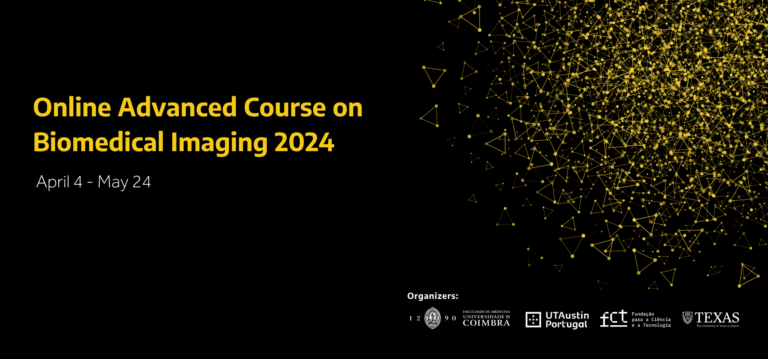
A second registration round is open until April 17, so scroll down right to the registration button to get your seat.
The course offers a unique opportunity to learn from leading experts from Portugal, Texas (UT MD Anderson Cancer Center) and Germany (German Cancer Research Center) about topics intersecting with the course’s broader theme. You can register for all sessions or simply choose to attend those more aligned with your needs and goals.
For the first time, the course will host a session dedicated to Dosimetry and Microdosimetry. Participants will also get to dive into the latest trends in artificial intelligence and data science applied to biomedical imaging and learn about the outcomes of exploratory and industry-driven research projects in the area of Medical Physics bearing the Program’s seal.
You can earn 10 ECTS units from the University of Coimbra if you comply with attendance and evaluation requirements. Learn more about this in our FAQs section.
Admission to the course is free of charge unless you decide to go through the evaluation procedure to be awarded ECTS credits.
For a detailed view of each day’s agenda, mouse over the “day” button. Please note that this is a tentative agenda.
The course will be delivered in English, except for one session (please refer to the agenda)
*All hours according to Lisbon time zone (GMT)
OCT and Optical imaging
1.45 p.m. – 2 p.m.: Opening remarks. Ana Salomé Lourenço (FMUC), Ana Margarida Abrantes (FMUC)
2 p.m. – 3 p.m.: OCT: physical basis. Rui Bernardes (FMUC)
3 p.m. – 4 p.m.: OCT: applications. Rui Bernardes (FMUC)
– Break –
4.30 p.m. – 5.30 p.m.: Optical imaging physics. Miguel Morgado (FCTUC)
5.30 p.m. – 6.30 p.m.: Optical imaging applications. Mafalda Laranjo (FMUC)
6.30 p.m. – 7 p.m.: Q&A and Discussion
7 p.m. – 7.15 p.m.: Articles delivering and discussion about examination. Ana Salomé Lourenço (FMUC), Francisco Caramelo (FMUC – iCBR)
Radiology and mammography
2 p.m. – 3 p.m.: Conventional radiology and mammography: Physical basis. Francisco Caramelo (FMUC – iCBR), Nuno Ferreira (FMUC)
3 p.m. – 4 p.m.: Conventional radiology: Clinical applications. Ana Paula Borges (CHUC)
– Break –
4.30 p.m. – 5.30 p.m.: Mammography: Clinical applications. Manuela Gonçalo (Coimbra Hospital & University Centre)
5.30 p.m. – 6.30 p.m.: Interventional radiology. Paulo Donato (University of Coimbra)
6.30 p.m. – 7 p.m.: Q&A and Discussion
Microscopy and Ultrasonography
2 p.m. – 3 p.m.: Optical and Confocal microscopy. Henrique Girão (FMUC – iCBR)
3 p.m. – 4 p.m.: Electronic microscopy. Maria Fátima Martins (FMUC)
– Break –
4.30 p.m. –5.15 p.m.: Ultrasonography: Physical basis. Francisco Caramelo (FMUC – iCBR)
5.30 p.m. – 6.30 p.m.: Ultrasonography: Applications and ultrasound contrast. Pedro Belo Soares (FMUC/CHUC) (This session will be held in Portuguese)
6.30 p.m. – 7 p.m.: Q&A and Discussion
Nuclear medicine
2 p.m. – 2.45 p.m.: Gamma camera and advances. Salomé Pires (FMUC)
2.45 p.m. – 3.15 p.m.: PET new architecture. Nuno Ferreira (FMUC)
3.15 p.m. – 4.30 p.m.: Reconstruction of nuclear medicine images (SPECT and PET). Nuno Ferreira (FMUC), Francisco Caramelo (FMUC – iCBR)
– Break –
5 p.m. – 6.30 p.m.: Nuclear medicine applications. Paula Lapa (University of Coimbra)
6.30 p.m. – 7 p.m.: Q&A and Discussion
UC & INESC TEC – Session on Artificial Intelligence and Data Science
2 p.m. – 3 p.m.: Artificial intelligence and data extraction in biomedical images. Bárbara Oliveiros (FMUC)
3 p.m. – 4 p.m.: Computer Vision and Machine Learning Challenges in Cancer Research. Hélder Oliveira (FCUP & INESC TEC)
– Break –
4.30 p.m. – 5.30 p.m.: AI Challenges in Heart Sound Processing for Cardiac Diagnosis. Francesco Renna (FCUP & INESC TEC)
5.30 p.m. – 6 p.m.: Q&A
6 p.m. – 7 p.m. – Further Discussions
UT MD ANDERSON CANCER CENTER – Session on PET
2 p.m. – 3 p.m.: PET I. Basis. Osama Mawlawi (MDACC)
3 p.m. – 4 p.m.: PET II. Quality Assurance, Testing and Quantification. Osama Mawlawi (MDACC)
– Break –
4.30 p.m. – 6 p.m.: Advances in PET/CT Imaging. Osama Mawlawi (MDACC)
6 p.m. – 6.30 p.m.: Q&A and Discussion
Magnetic resonance imaging
2 p.m. – 3 p.m.: Physics of MR Imaging. Main pulse sequences and image artifacts. Andreia Gaspar
3 p.m. – 4 p.m.: MRI contrast agents. Biochemistry. Isabel Prata (University of Porto)
4.30 p.m. – 6 p.m.: Applications and recent trends in MRI. Filipe Caseiro Alves (FMUC/CHUC)
6 p.m. – 7 p.m.: Q&A and Discussion
Computed Tomography
2 p.m. – 5 p.m.: CT: Physical basis. Augusto Silva (University of Aveiro)
3 p.m. – 4 p.m.: CT technical update for clinical applications. Filipe Caseiro Alves (FMUC/CHUC)
– Break –
4.30 p.m. – 5.30 p.m.: Basis of Super-resolution. Francisco Caramelo (FMUC – iCBR)
5.30 p.m. – 6.30 p.m.: Dosimetry/Radioprotection for radioactive sources. Augusto Oliveira
6.30 p.m. – 7 p.m.: Q&A and Discussion
Radiotherapy
2 p.m. – 3 p.m.: Physical Basis of Radiotherapy (LINAC). Paulo César Simões (CHUC)
3 p.m. – 4 p.m.: Hadrontherapy. Paulo Crespo (University of Coimbra)
– Break –
4.30 p.m. – 5.30 p.m.: SEMINAR with DKFZ: New methods in Radiotherapy: MR-guided. Oliver Jäkel (DKFZ)
5.30 p.m. – 6.30 p.m.:Advances on target organs delineation and Clinical application. Inês Nobre Góis (CHUC)
6.30 p.m. – 7 p.m.: Q&A and Discussion
RMN spectroscopy
2 p.m. – 4 p.m.: RMN spectroscopy. Biochemical basis. Rui Brito (University of Coimbra)
– Break –
4.30 p.m. – 5.30 p.m.: RMN spectroscopy applications. Marco Alves (University of Porto)
5.30 p.m. – 7 p.m.: Q&A and Discussion
UT MD ANDERSON CANCER CENTER, DKFZ & UT Austin Portugal – Session on Proton Therapy
2 p.m. – 2.45 p.m.: Principles and Practices of Proton Therapy. Falk Poenisch (MDACC)
2.45 p.m. – 3.45 p.m.: Image-guided Planning and Delivery of Proton Therapy. Fahed M. Alsanea (MDACC)
– Break –
4.15 p.m. – 5.15 p.m.: Towards Real-Time PGS Range Monitoring in Proton Therapy of Prostate Cancer. João Seco (DKFZ)
5.15 p.m. – 6.30 p.m.: Presentation of UT Austin Portugal Projects:
6.30 p.m. – 7 p.m.: Q&A and Discussion
UT MD ANDERSON CANCER CENTER – Radiobiology
2 p.m. – 4 p.m.: Basics of radiation physics, radiobiology dosimetry and radiobiology. Gabriel Sawakuchi (MD Anderson)
4 p.m. – 4:30 p.m.: Break
4:30 p.m – 5:15 p.m.: Radiation-induced DNA damage and DNA repair. Scott Bright (MD Anderson)
5:15-6:00 pm: Radiation-induced immune activation. Poliana Marinello (MD Anderson)
6-6:30 pm: Q&A
Click on the question on the left-hand side of the table to see the answer.
Specifically designed for pregraduate and postgraduate students, healthcare professionals, biomedical engineers, physical engineers, physicists, researchers, medical residents, medical oncologists, nurses and medical imaging and radiotherapy technologists, this online course will give you a comprehensive overview of the main imaging methodologies used in biomedicine. To this end, the course scientific coordinators have invited a panel of more than 30 high calibre experts from Portugal, Texas and Germany to deliver a set of talks organized into thematic sessions.
The main physical principles and methodologies used in biomedical imaging techniques, such as data processing coming from morphological (Proton Therapy, CT, MRI, US/Doppler) or functional (SPECT, PET, Optical) approaches, including multi-modality systems will be analyzed. The basics of image formation, detection and measurement, sources of noise and artefacts, corrections, data and image processing and analysis, state-of-the-art and expected future developments will be presented and discussed.
Sessions are organized to provide room for discussion between experts and the audience, thereby encouraging the exchange of views, experiences and know-how. The brainstorming around new research ideas may also trigger the development of new research projects under the Program’s funding sources or others.
The Advanced Course on Biomedical Imaging intends to:
Regardless of whether you are looking to earn 10 ECTS credits or not, you must always register first through this form. To be eligible for such credits, you will be required to complete your registration at the University of Coimbra only after being admitted by UT Austin Portugal for attendance at the online sessions.
Registrations are open until April 17 (Phase II*).
(*) Registration Deadline: The second phase for registrations is open until April 17. If you are looking to earn ECTS credits, check directly with the University of Coimbra the deadline for completing your registration.
No, you are not, unless you are looking to earn 10 ECTS credits granted by the University of Coimbra.
If you do not wish to claim ECTS credits, you can just pick the sessions that are more aligned with your learning goals and needs. However, we advise you to register for all the sessions if your goal is to improve your knowledge of the course’s underlying theme.
To earn ECTS credits, you must register twice: firstly, through this form to sign up for the online sessions; secondly, after being admitted to the online sessions, directly at the Faculty of Medicine of the University of Coimbra.
Full attendance will grant you 10 ECTS credits, issued by the University of Coimbra. Unlike other attendants, you will be subject to evaluation at the end of the course. This evaluation procedure will take place after the course, the only session taking place at the premises of the Biophysics Institute, iCBR, Faculty of Medicine of the University of Coimbra.
To be eligible for these credits, you must be a postgraduate and register directly at the University of Coimbra once you have registered through the UT Austin Portugal form and been admitted to the online sessions. If you are a student of the University of Coimbra please send an e-mail to phdhs@fmed.uc.pt. If you are a student from another Portuguese University, you may register here but please note that the University of Coimbra will charge you €450.
Fees will be charged by the University of Coimbra only to participants looking to obtain ECTS credits. Attendance with no credits attached will not be charged.
For questions regarding ECTS credits, please send an e-mail to phdhs@fmed.uc.pt.
To gain a certificate of attendance you need to attend, at least, 75% of the online course and complete a course feedback form. Attendance can be verified on Zoom reports. Participants registering for ECTS credits should consult directly with the University of Coimbra to learn about the requirements for certificate of attendance eligibility.
You should contact FMUC’s Local Organizing Team at biophysics@fmed.uc.pt.
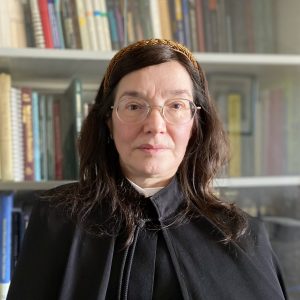 |
Filomena Botelho – Full Professor, Institute of Biophysics, Faculty of Medicine, iCBR, University of Coimbra, Coimbra, Portugal |
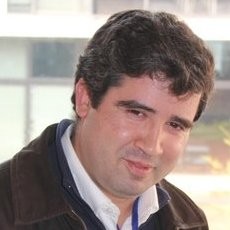 |
Francisco Caramelo – Assistant Professor, Faculty of Medicine, University of Coimbra, Coimbra, Portugal |
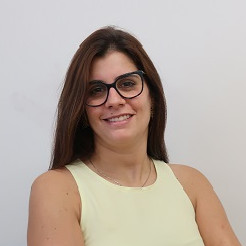 |
Margarida Abrantes – Assistant Professor, Faculty of Medicine, University of Coimbra, Coimbra, Portugal |
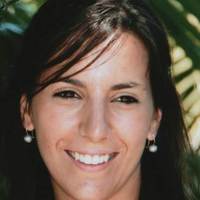 |
Salomé Pires – Invited Assistant Professor, Faculty of Medicine, University of Coimbra, Coimbra, Portugal |
Navigate through our playlists and (re)watch all the sessions of the 2022 and 2023 editions of the Advanced Course on Biomedical Imaging, which covered a broad spectrum of topics related to biomedical imaging!